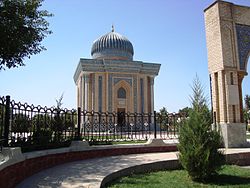El Maturidi (Uzbekistan) Maturid 870 of Samarkand, 945 of Samarkand. Hanafi theologian, jurist and commentator of the Qur’an (interpreter), founder of Maturidiyya theology, which is named after him. Muhammad Abu Mansur al-Maturidi (853–944). Effective advocate of innovative Islam. He is from Samarkand.
Literature on Maturidi
HUMANS WITH DIVINE WISDOM
Human Beings. Human Rationality
Maturidi managed to combine his view of God and the composition of the world through the concept of wisdom. In the process, wisdom was granted a key role in his general thought process. This impression becomes even stronger when Maturidi’s doctrines on human beings are taken into account.
Due to the wisdom of Allah, reason is given to man. Man differs from other living creatures in proportion to using it. Human beings dominate other living beings with the mind, distinguish between good and evil, gain knowledge with it, contemplate the universe, make use of it, find the creator, recognize and believe. That is, he gets faith. Thus, he finds peace in the world and the hereafter. For this reason, mind is a mercy created by the great creator with wisdom.
According to him, reason and wisdom are the same in many ways. The real wisdom of giving the essence of mind to human beings is to know Allah, His actions and His wisdom in the world, to serve as a servant in the world of wisdom and testing in line with the Creator’s will and to attain happiness in the world and the hereafter. According to Mâtürîdî, the wisdom of the creation of this world to be tested and to pass the test is for the most honorable being, that is, “human”.
The human being is the only created being who perceives all signs based on ḥikma; the only one in this world who reflects on and understands their indications and specifications. From this perspective, human activity constantly relates to divine wisdom because wherever the latter manifests, human intellect is called upon to know and understand what has been manifested. Human rational knowledge, as we have come to know, extends over various domains.
It encompasses ethical norms, analysis of the creation, as well as the proof that there is an omnipotent and omniscient Creator. This is the cornerstone of Maturidi’s entire intellectual edifice and it is no surprise that rational capacity occupies a central position in his definition of the human being. We have come across this definition earlier. It appears in two sentences that are formulated from entirely different perspectives.
The first is based on theological tradition and explains that human beings consist of an intellect and natures. This refers back to Maturidi’s ontological model, according to which a body consists of ṭabāʾiʿ, here incorporating the intellect as an additional accident as well. The second definition, however, states that the human being is “a rational mortal being.”
The universe was created full of wisdom, subtlety and proofs, and it was presented to human beings who had the ability to understand and reason, and wisdom was given to man as the ability to learn what is not taught, to do purposeful work and to do what he does soundly.
To Maturidi, wisdom simply means the assigning of things to their proper place, and giving everyone the share he deserves without disregard or negligence. Concerning the misfortunes and injustices of the world, Maturidi said that the human intellect as a created instrument, has its shortcomings and limits, and so many things are beyond its comprehension, and sometimes it is misled by outside influences from conceiving the real wisdom behind creation, not to mention that of God’s action and His works. For Maturidi, reason alone is unable to explain the existence of evil or apparent hardship which occur in this World.
From the evident order in the world and its being suitable for the living beings, Maturidi argued for the existence of God. According to him, everything in this world displays remarkable and impressive order, and also it indicates the wisdom behind its creation. The whole world is organised in such a way that no-one – even the wisest of men – can comprehend or grasp its real structure. Thus the structure of every object and living being discloses the wisdom and proves the existence of its creator.
Moreover, all the substances of the world are organized in certain ways to serve certain ends, and for the benefit of mankind. Everything is subject to certain patterns of movement and rest to serve certain purposes, all this points to the existence of God who controls the affairs of the whole world.
To Maturidi, the regular revolution of the sun and the moon, and the continuous interchange of days and nights resulting from their revolution, and their following of certain patterns without change or disproportion, proves that they have been designed in this certain way by a supreme being who has eternal knowledge and full control over the affairs of this world.
Men are naturally dependent on each other for their existence and sustenance, and their affairs are arranged in such a way as to make it impossible for each one to be self-sufficient. All this, according to Maturidi, indicates that there is an external force behind this arrangement which has full control over the whole world and that is God, the all knowing the wise and the powerful.
Emphasizing the point that God’s justice and His wisdom make it necessary that certain actions must be attributed to man. Maturidi strongly defended the absolute power of God and His will which influence and embrace all man’s actions. Man is a responsible agent who has been created for judgement (mihna) and has been provided with the means by which he can distinguish between things thus being able to carry out his responsibility. Therefore, he must have real action and must have some freedom to perform these actions. To establish this proposition, Maturidi argued from both reason and revelation. He said that in many Qur’anic verses man has been commanded to do certain works or to refrain from others
Maturidi said that, “some people assumed that whoever acts without intending to benefit others by his actions is not wise, and whoever acts without aiming by his actions towards a certain purpose is fooling around (*abith).” They hold that it is not possible that God would do harm to anyone without deserving such a harm, considering it as obligatory to God to do what is best for others in matters concerning religion, and do for them whatever is good in the outcome.
Thus they limited God’s actions, in the sense that they must be intended either to cause benefit for others, or protect them from harm. They measured God’s acts to those of the wise men in that His actions must be in agreement with the principle of wisdom. They conceded, however, that God differs from the wise men among men, in that His doing or not doing an action would neither elevate nor debase Him, His actions neither bring Him benefit nor defend Him against harm. The wisdom in His actions is basically that they cause benefits and protect others from harm, otherwise they would just be useless. (‘abath).
Since, in general, wisdom and justice are good and injustice and foolishness are bad, we must affirm that all God’s actions are according to wisdom, justice or unmerited grace (fadl) and beneficence (ihsan), because He is the most beneficent, self-sufficient and all-knowing, and it would be inappropriate to ascribe injustice or foolishness to him who has such characteristics.
Since things in relation to justice and injustice, foolishness or wisdom, differ according to the differences of circumstances, it is quite possible that their real nature might be concealed from reason. Therefore, it would be very difficult for human reason to judge God’s actions or His law as being wise or foolish, just or unjust.
Reason, to Maturidi, is a created instrument, which has its shortcomings and limitations. Its judgements are largely influenced by its own circumstances, so it might be afflicted by something which prevents it from distinguishing between wisdom and foolishness. Therefore, we must assume that wisdom exists in all God’s actions whether we are able to conceive it by our intellect or not.
Maturidi said that since God possesses the qualities of essential knowledge, power, might and life, none of which wise men possess, there is no justification in comparing His actions to the actions of the wise men.
Moreover, there is none of the wise men, in the present, who is not liable to foolishness, similarly the self-sufficient and powerful among them is liable to possess the opposite of these qualities. In fact the wise men were possessors of these opposite qualities, then they were given self-sufficiency and power. However, they do not possess these qualities in their absolute natures, but in the limited sense, according to their experience and previous learning. In judging a certain case they have to depend on their stored knowledge and previous experience.
Thus, for a man, regardless of his wisdom, to claim judgement on God’s actions would be presumptious. This can be explained further by the fact that every wise man knows that he is ignorant of so many things, that he is incapable and in need regarding various matters; he also knows very well his foolishness in respect of so many things. A man of such characteristics would be foolish and ignorant to indulge in judgement on God’s actions.
Maturidi added that the reason behind the creation is the fulfillment of God’s commandments and His prohibitions, and the realization of attraction and intimidation. To explain this point, Maturidi said that God created His creature and provided him with all the means of attaining knowledge, and bestowed on him many favours and graces.
Therefore, it is most likely that man should be accountable for his actions, thus would be punished and rewarded according to his conformity with God’s commandments and prohibitions. Thus, to Maturidi, the main purpose behind the creation is the kulfa or mihna, that is, the judgement of man in the hereafter.
As for the second question, that is the existence of evil in the world, Maturidi said that there is a wisdom behind the creation of evil things such as: snakes and harmful substances, though our intellect might not be capable enough to grasp the divine wisdom in that, or fail to know the nature of the wisdom in them. He pointed out that these evil things should be considered in relation to the good ones, in order to attain reasonable explanation for their creation.
Man can attain such knowledge through his intellect, but not all people are able to do so, therefore, these evils are created to warn those who are intellectually incapable of distinguishing between what benefits them and what causes them harm.
Human is a “creature the most honorable” and “caliph” because of his intellect and will and the ability to realize and grip the wisdom. He knows that the world is a field where the wisdom is full in it for Hereafter and says that every creature except for him serve to himself directly or indirectly. Consequently Maturidi founded many subjects related with genesis and divine acts as heaven and earth, beneficence and evil, favor and badness, order and prohibition, prophethood, hereafter, worship, thanksgiving and fate from the perspective of wisdom with reason and revelation.
However, Maturidi does add the qualification that the intellect cannot distinguish the good from the bad in every case. It only knows the basic guidelines and knows, for example, that injustice and ignorance are ugly (qabīḥ), while justice and wisdom are beautiful (ḥasan). In many individual cases, however, good and bad emerge at the same time; here humans often need divine instruction to implement the proper evaluation.
THE PLACE Of REASON IN THE THEOLOGY OF MATURİDİ AND AL-ASH’ARI / PHD
BY AHMAD MOHAMAD AHMAD EL-GALLI Thesis presented to the University of Edinburgh for the Degree of Doctor of Philosophy February 1976






















